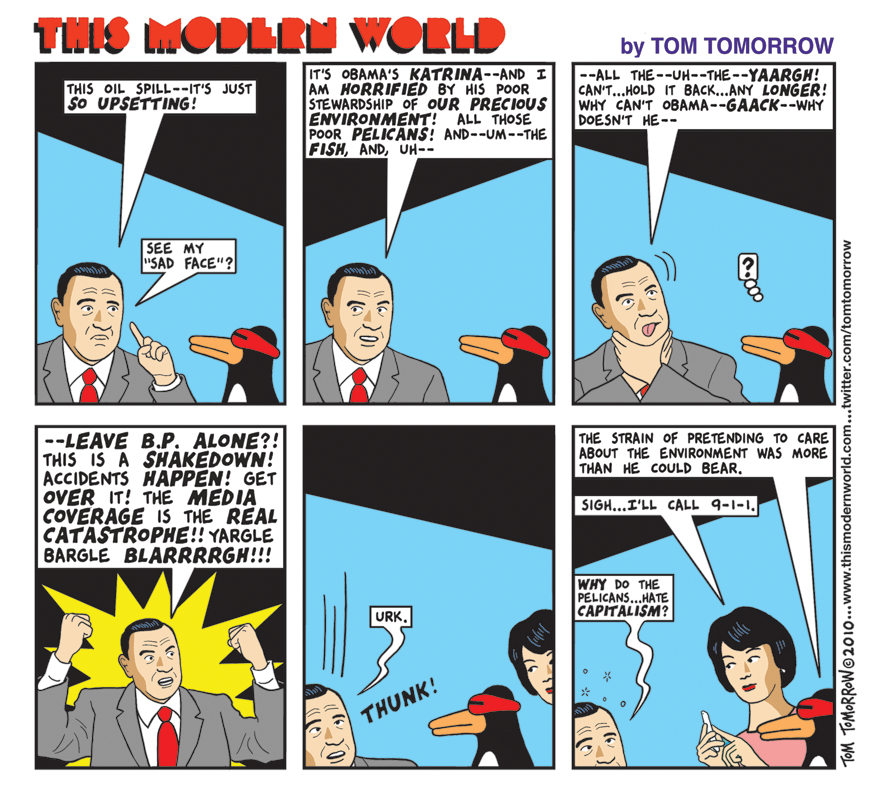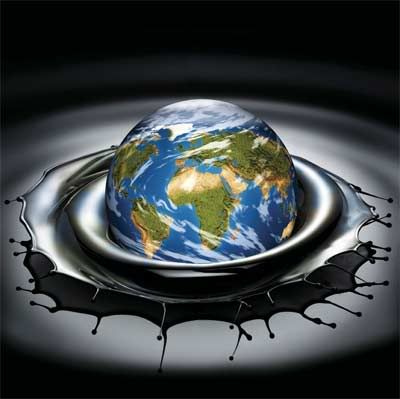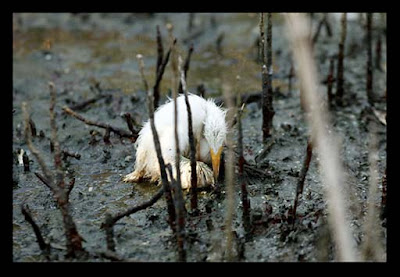
Tag: Oil Leak
Jul 07 2010
Why Do Pelicans Hate Capitalism?
Jul 01 2010
BP’s Well May Leak For 55 Years Or More Into The Gulf Of Mexico?
On June 15, 2010 the US Department of Energy announced that a group of federal and independent scientists convened by Secretary of Energy Steven Chu, Secretary of the Interior Ken Salazar, and Chair of the National Incident Command’s Flow Rate Technical Group (FRTG) Dr. Marcia McNutt (Director of the U.S. Geological Survey) had developed a new estimate for the amount of oil gushing from the ruptured well in the Gulf of Mexico that indicated the leak could be spewing up to 2.52 million gallons of crude oil per day into the waters of the Gulf of Mexico from British Petroleum’s Macondo Well.
“This estimate brings together several scientific methodologies and the latest information from the sea floor, and represents a significant step forward in our effort to put a number on the oil that is escaping from BP’s well,” said Chu, who then expanded with “As we continue to collect additional data and refine these estimates, it is important to realize that the numbers can change. In particular, the upper number is less certain – which is exactly why we have been planning for the worst case scenario at every stage and why we are continuing to focus on responding to the upper end of the estimate, plus additional contingencies.”
Estimates from both BP and from the US Government of the amount of oil gushing from the blown out wellhead on the gulf seabed have been almost continually revised upwards since the well blowout and leak began on April 20, with widespread suspicions that BP has deliberately understated the leak rate in attempts to limit liability for the company.
It now appears that Chu may have been somewhat prescient with his statement that “it is important to realize that the numbers can change”, and that the estimate of oil leaking into the Gulf of Mexico may need to be increased again, since an undated internal BP document (.PDF) obtained by Chairman of the House Select Committee on Energy Independence and Global Warming Congressman Ed Markey (D-MA) was released by Markey on Sunday June 20 showing that BP’s own internal analysis believed that a worst-case scenario, based on damage to the well bore, could result in a leak rate from the well of 55,000 to 100,000 barrels of oil per day.
Jun 26 2010
Is BP’s Blow Out Preventer Falling Off The Well Pipe?
 After a video was released on June 13th recorded from BP’s underwater Viking Poseidon ROV 1 operating in the Gulf of Mexico near the blown out Macondo Well site showing what appeared to be oil leaks from gulf seabed cracks around BP’s well site, it seemed that it would be only a question of time before an oil saturated gulf seabed turning to wet slippery jello would no longer have the structural strength to support the weight of BP’s large steel 450 ton Blow Out Preventer (BOP) apparatus sitting on top of the well pipe projecting from that seabed.
After a video was released on June 13th recorded from BP’s underwater Viking Poseidon ROV 1 operating in the Gulf of Mexico near the blown out Macondo Well site showing what appeared to be oil leaks from gulf seabed cracks around BP’s well site, it seemed that it would be only a question of time before an oil saturated gulf seabed turning to wet slippery jello would no longer have the structural strength to support the weight of BP’s large steel 450 ton Blow Out Preventer (BOP) apparatus sitting on top of the well pipe projecting from that seabed.
“http://www.antemedius.com/files/images/BOP.jpg
Jun 23 2010
Oil Rain In Louisiana?
Posted to youtube June 22, 2010 by user HistoryTours
this looked exactly like what we saw yesterday under the Bay Saint Louis Miss Bridge On Our Way Out To Cat Island In The Gulf. Thick Brown Gooey Foam
…………………………
Qualification: I have no way of knowing if that video is of a current event or if it is raining in the video scenes. Although I suspect undecomposed oil is probably too heavy to evaporate, I think that strong storms (hurricanes, etc) can probably physically transport crude oil and spread it inland, and I would imagine that some of the products of chemical breakdown of oil, and reaction products between oil and corexit, the dispersant BP is using, can evaporate and produce toxic rain. Some of those reaction products I imagine might cause ‘rainbow’ slicks on streets like what is shown in the video.
Crude oil contains the powerful cancer-causing chemicals benzene, toluene, heavy metals and arsenic.
(hat tip to Washington’s Blog: Health Risks from Oil Spill: “Some of the Most Toxic Chemicals that We Know” , “Every Place Can be Ground Zero”, CDC Advises “Everyone” to Avoid Oil)
See the following links to and excerpts from Oil in the Sea III: Inputs, Fates, and Effect (2003), a paper produced by the Committee on Oil in the Sea: Inputs, Fates, and Effects, Ocean Studies Board (OSB), the Marine Board (MB), and the Transportation Research Board (TRB)
Jun 23 2010
Gulf Oil Leak May Be Over 4 Million Gallons Per Day
Last week on June 15 the US Department of Energy announced that a group of federal and independent scientists convened by Secretary of Energy Steven Chu, Secretary of the Interior Ken Salazar, and Chair of the National Incident Command’s Flow Rate Technical Group (FRTG) Dr. Marcia McNutt (Director of the U.S. Geological Survey) had developed a new estimate for the amount of oil gushing from the ruptured well in the Gulf of Mexico that indicated the leak could be spewing up to 2.52 million gallons of crude oil per day into the waters of the Gulf of Mexico from British Petroleum’s Macondo Well.
“This estimate brings together several scientific methodologies and the latest information from the sea floor, and represents a significant step forward in our effort to put a number on the oil that is escaping from BP’s well,” said Chu, who then expanded with “As we continue to collect additional data and refine these estimates, it is important to realize that the numbers can change. In particular, the upper number is less certain – which is exactly why we have been planning for the worst case scenario at every stage and why we are continuing to focus on responding to the upper end of the estimate, plus additional contingencies.”
Estimates from both BP and from the US Government of the amount of oil gushing from the blown out wellhead on the gulf seabed have been almost continually revised upwards since the well blowout and leak began on April 20, with widespread suspicions that BP has deliberately understated the leak rate in attempts to limit liability for the company.
It now appears that Chu may have been somewhat prescient with his statement that “it is important to realize that the numbers can change”, and that the estimate of oil leaking into the Gulf of Mexico may need to be increased again, since an undated internal BP document (.PDF) obtained by Chairman of the House Select Committee on Energy Independence and Global Warming Congressman Ed Markey (D-MA) was released by Markey on Sunday June 20 showing that BP’s own internal analysis believed that a worst-case scenario, based on damage to the well bore, could result in a leak of 100,000 barrels of oil per day.
Jun 15 2010
BP Hiding Oiled Animal Carcasses Washing Up On Gulf Beaches?
On MSNBC’s Countdown with Keith Olbermann Monday night, Marine toxicologist Riki Ott alleged that British Petroleum (BP) is trying to discourage or disallow public and media from seeing some of the horrific results of their oil leak by removing oiled animal carcasses from Gulf beaches.
“Turtle watch volunteers who walk the beaches consistently every morning at 6:00 a.m., they’re saying the carcasses are disappearing”
“People who walk the beaches at night, they’ve seen little baby dolphins wash up dead, flashlights, people descend out of nowhere, carcass gone in 15 minutes.
There’s reports from offshore of massive kills on the barrier islands from fishermen who have been working on the spill response…
BP’s response has been to use metal detectors to keep and prevent the people from even taking cell phones out to photograph this.”
There have been reports in the past few days of BP hiring private security contractors to keep the public and media away from oiled beaches.
This video is from MSNBC’s Countdown June 14, 2010.
Jun 14 2010
Oil Leaks From Gulf Seabed Cracks Around BP’s Well Site?
BP has a collection of ‘bots’ or ROV’s, remotely operated vehicles, tethered underwater robots operating in the Gulf of Mexico near the blown out Macondo Well site, while they attempt to either plug the leak or at least find ways to recover and siphon off the leaking oil.
Sitting on top of the well pipe projecting from the seabed is the BOP, or Blow Out Preventer, the large steel 450 ton apparatus that you may have seen in various photographs and videos from BP’s Live Feed as they recently cut off the top of the riser pipe that ran from the BOP to the Deepwater Horizon platform before it burned and sank.
There has been much speculation lately that the well bore is damaged below the seabed and that oil is leaking out of the well into the seabed underneath and around the BOP.
Keeping in mind that the BOP weighs 450 tons it would seem that if the seabed is becoming saturated with oil leaking through it that is only a question of time before the seabed will no longer have the structural strength to support the weight of the BOP and that it could fall off the top of the well pipe it is sitting on, releasing an uncontrolled and uncontrollable flow of oil into the gulf with no way of plugging or stopping it.
BP denies that oil or gas are leaking from cracks in the sea floor on the bottom of the Gulf of Mexico.
This video was recorded from the Viking Poseidon ROV 1 on June 13th, 2010, and appears to show bursts of oil leaking from cracks in the seabed.
BP’s live feed from the Viking Poseidon ROV 1 is here, with the disclaimer ” Please be aware, this is a live stream and may freeze or be unavailable from time to time.”
Jun 08 2010
Beyond Paradox & Look, We’re Dealing With Criminals
07 June 2010 – Attorney General Eric Holder announced that he would be launching a criminal investigation into the activities of BP that led to the massive oil spill in the Gulf of Mexico. But can we trust an AG who worked at one of the biggest corporate defense firms in the world? Mike Papantonio appears on The Randi Rhodes Show to take on BP, as well as explain the basics of his class action suit against BP.
Jun 05 2010
The Sword’s Edge: Obama And Big Oil
 I posted this video interview almost 2 years ago here on November 29, 2008, and after the recent and ongoing poisoning of the Gulf of Mexico caused a least I think in part by the regulatory corruption of MMS and the US government by BP and the other oil companies, maybe it’s time to revisit the predictions made in this so long ago.
I posted this video interview almost 2 years ago here on November 29, 2008, and after the recent and ongoing poisoning of the Gulf of Mexico caused a least I think in part by the regulatory corruption of MMS and the US government by BP and the other oil companies, maybe it’s time to revisit the predictions made in this so long ago.
Antonia Juhasz is the author of The Bu$h Agenda: Invading the World, One Economy at a Time and most recently, The Tyranny of Oil: The World’s Most Powerful Industry, and What We Must Do To Stop It.
Juhasz is a policy-analyst and a Fellow with Oil Change International, “a research and advocacy organization that exists to force progress in the energy industry towards an environmentally and socially sustainable energy future”, and the Institute for Policy Studies, a policy studies non-profit think-tank for progressive or liberal causes based in Washington, D.C. IPS work is organized into over a dozen projects, all working collaboratively and strategically to pursue three overarching policy goals: Peace, Justice and the Environment.
She has taught at the New College of California in the Activism and Social Change Masters Program and as a guest lecturer on U.S. Foreign Policy at the McMaster University Labour Studies Program in a unique educational program with the Canadian Automobile Workers Union, and lives in San Francisco.
Antonia talked with Sharmini Peries of the The Real News about whether or not Barack Obama is likely to buck, or back, the most powerful corporations in the world, and whether he’ll continue the same foreign policies that have over the past 60 odd years of “pragmatic” conservative US imperialism nearly brought the empire to it’s knees, drastically lowering the amount of expenditures on liberal social policies.
Real News: November 29, 2008 – 7 min 37 sec
Will Obama rein in big oil?
Antonia Juhasz: Clinton-era deregulation helped big oil get bigger
Jun 03 2010
Gulf Oil Could Leak For Years
Well known CUNY Physics Professor Michio Kaku appeared on NBC’s Today Show with some disturbing comments.
RawStory reports:
After six methods for stopping the [Deepwater Horizon] leak failed, BP is now trying a seventh method: “cut and cap.”
[snip]
If this seventh attempt fails, the next option will be to wait on one of two relief wells to intercept and block the original well. This is considered the best hope for permanently stopping the flow, but those wells won’t be in place until August at the soonest. Some predict that it could take until Christmas.But Kaku thinks that even those predictions could be too optimistic.
“You would have to win the lottery to get on the first try an exact, an exact meeting at the bottom of the well in order to pump cement to shut it off,” Kaku told NBC’s Matt Lauer Wednesday.
If the attempt fails, the drill will be reversed, the hole will be filled with cement and they will try again.
“You have to do this over and over again until you get it just right,” Kaku said. “It takes many tries. So August is optimistic.”
“So this could be spewing oil for months. Could it last for a year?” asked Lauer.
“It could last for years, plural. Okay? If everything fails and all these different kinds of relief wells don’t work, it could be spewing stuff into the Gulf until we have dead zones, entire dead zones in the Gulf. For years,” Kaku said.
This video is from NBC’s Today Show, broadcast June 2, 2010.
Jun 01 2010
“Feds open criminal probe of Gulf oil spill”
Full text of speech below
PORT FOURCHON, La. – Attorney General Eric Holder said Tuesday that federal authorities have opened criminal and civil investigations into the nation’s worst oil spill, and BP lost billions in market value when shares dropped in the first trading day since the company failed yet again to plug the gusher.
Investors presumably realized the best chance to stop the leak was months away and there was no end in sight to the cleanup. As BP settled in for the long-term, Holder announced the criminal probe, though he would not specify the companies or individuals that might be targeted.
“We will closely examine the actions of those involved in the spill. If we find evidence of illegal behavior, we will be extremely forceful in our response,” Holder said in New Orleans.
May 27 2010
BP’s Gulf Blowout And Our Future

[My friend M sent me the following thoughts which I crosspost here from Fire on the Mountain with permission.]
Our son-in-law, Lee, earns his living as a fisherman in Key West. Has done so for 30 years. Today is his 52nd birthday and he is now, effectively, jobless for the rest of his life. Being a small fisherman has always been an iffy proposition, because you’re dependent so much on the weather, and for the last few years, the weather has become totally unpredictable. Also for the past five years NOAA has been imposing increasingly severe restrictions on what fishers can catch — how much and when and where — all in the name of preserving fish populations.
